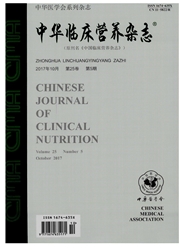

 中文摘要:
中文摘要:
目的研究鱼油脂肪乳对胃癌患者术后炎症反应和临床预后的影响。方法采用随机、对照的方法将46例胃癌患者分为对照组(n=24)和实验组(n=22)。根据等氮等热量原则于术后第1天开始连续5d行肠外营养治疗,实验组加用鱼油脂肪乳。检测两组患者术前及术后1、5d血常规、类二十烷酸(PGE2,LTB4)、促炎细胞因子(IFN-γ)和抗炎细胞因子(IL-10,TGF-β)的水平并观察临床预后情况(术后住院时间,术后肛门排气时间,感染发生率及并发症发生率)。结果术后第5天,实验组自细胞计数,中性粒百分比,淋巴细胞百分比,PGE2和LTB4的水平,IL-10/IFN-γ比值,TGF-β/IFN-γ比值与对照组比较差异有统计学意义(P〈0.05);实验组术后肛门排气时间较对照组明显缩短(P〈0.05)。结论鱼油脂肪乳能够减轻胃癌患者术后炎症反应,改善临床预后。
 英文摘要:
英文摘要:
Objective To investigate the effect of fish oil fat emulsion on inflammatory response and clinical outcomes in postoperative gastric cancer patients. Methods We designed a randomized, controlled study: forty-six gastric cancer patients undergoing radical gastrectomy were enrolled in this study, including control group ( n=24 ) and study group ( n=22 ) . According to the isocaloric and isonitrogenous principle, total parenteral nutrition ( TPN ) was transfused from the first day to the fifth day postoperatively in control group, and the study group received fish oil fat emulsion additionally. The routine blood test, levels of eicosanoids ( PGE2, LTB4 ) , proinflammatory cytokine ( IFN-γ) and anti-inflammatory cytokines ( IL-10, TGF-γ ) were detected on the day before operation, the first and fifth day after operation. In the meantime, we recorded the clinical outcomes, including the length of postoperative hospital stay, the time of anus exhaust, the incidence of infection and complications after operation. Results On the fifth day after operation, we found that the study group had a statistically significant difference compared with control group in leukocyte count, the percent of neutrophile granulocyte and lymphocyte, levels of PGE2, LTB4, ratio of IL-10/IFN-γ, ratio of TGF-β/IFN-γ ( P〈0.05 ) .And the time of anus exhaust in study group was markedly shorten compared with control group ( P〈0.05 ) . Conclusion Parenteral supplementation of fish oil fat emulsion lightens inflammatory response and improves clinical outcomes in postoperative gastric cancer patients.
 同期刊论文项目
同期刊论文项目
 同项目期刊论文
同项目期刊论文
 Risk factors for hospital readmission after radical gastrectomy for gastric cancer: a prospective st
Risk factors for hospital readmission after radical gastrectomy for gastric cancer: a prospective st Association between the transcriptional levels of Htr-1a and tryptophan hydroxylase-1 in the hippoca
Association between the transcriptional levels of Htr-1a and tryptophan hydroxylase-1 in the hippoca Sarcopenia, as defined by low muscle mass, strength and physical performance, predicts complications
Sarcopenia, as defined by low muscle mass, strength and physical performance, predicts complications Anti-fatigue effect of ginsenoside Rb1 on postoperative fatigue syndrome induced by major small inte
Anti-fatigue effect of ginsenoside Rb1 on postoperative fatigue syndrome induced by major small inte Mitochondrial energy metabolism disorder and apoptosis: a potential mechanism of postoperative ileus
Mitochondrial energy metabolism disorder and apoptosis: a potential mechanism of postoperative ileus Ginsenoside Rb1 improves postoperative fatigue syndrome by reducing skeletal muscle oxidative stress
Ginsenoside Rb1 improves postoperative fatigue syndrome by reducing skeletal muscle oxidative stress 期刊信息
期刊信息
